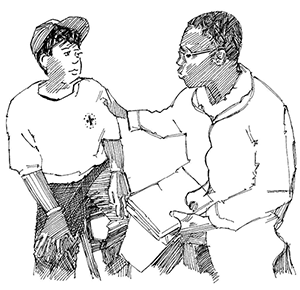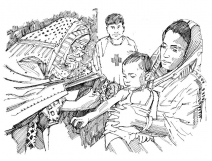24. Routine vaccinations
Overview
-
Vaccination against many common diseases is given as part of routine vaccination programmes in most countries. Some common, yet serious illnesses (for example, diphtheria, tetanus, pertussis (whooping cough), polio, measles, rubella, mumps, chicken pox, meningitis, hepatitis B, yellow fever and tuberculosis) can kill or cripple children or adults for life. Vaccines protect people from getting and developing severe forms of the diseases and from spreading disease to others. Promoting routine vaccination against these diseases is an important activity in prevention. For personal safety and protection, it is important that volunteers themselves receive routine vaccinations.
-
Vaccines are usually given to infants in the first years of life. Additional doses may be given later in accordance with national immunization schedules (for example, pregnant women may receive additional doses of tetanus vaccine during pregnancy).
- To achieve optimal community protection, every child should be vaccinated as part of the routine vaccination programmes. Routine programmes and schedules vary from country to country.
What to do and how to do it
Preparing to promote routine vaccination
- Speak with your local health authority about ages when children are vaccinated and familiarize yourself with the national immunization schedule.
- Find out the specific vaccination schedule from health authorities in your area.
- Find out where to go to obtain vaccinations.
- Find out when vaccinations are given in your area
- Vaccinations should sometimes be deferred for persons with a moderate or severe acute illness, but the person is usually recommended to be vaccinated when the illness has improved.
Promoting routine vaccination
- Every child should be vaccinated. A child who has not been vaccinated is more likely to die of diseases or to get a severe form of disease. Parents and caregivers should be encouraged to keep their child’s vaccination cards and to bring them to health centres if/when they bring their child for care or check-ups.
- Get to know families with babies under one year of age and visit them once a month.
- If caregivers do not bring their children to the vaccination clinics, find out why.
- The vaccination status of older children should be checked and, if they have not been vaccinated, they should be considered for vaccination.
- If caregivers do not bring their children to the vaccination clinics, find out why.
- Get to know families with babies under one year of age and visit them once a month.
- Pregnant women need at least two tetanus vaccinations before giving birth.
- Promote that pregnant women should visit the health worker for check-ups and should receive two doses of tetanus vaccine before their children are born.
Social mobilization, messaging, and community engagement
- Communicate clearly that vaccines are safe and effective
- Correct rumours and misinformation about vaccinations (see Action Tool Dealing with Rumours).
- Promote routine vaccination in communities
- If some members of the community are afraid of vaccinations, try to understand the reasons, and work with community members and leaders to calm and remove the population’s fears.


